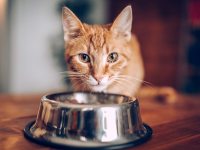Cat Overeating - Understanding and Effective Prevention
It’s rare to meet a feline friend who doesn’t have a slight obsession with food, treats, snacks, and the holy grail - wet food. But just like their human counterparts, cats can and do struggle with overeating and overindulging - leading to various health issues.
What’s the reason behind overeating and how do you prevent it?
Understanding the Behavior
While chubby cats are snuggly and adorable to look at, overeating in cats can be a highly complex issue with underlying causes. The most common are:
- Free-Feeding: While some cats make wonderful grazers who can snack throughout the day, other cats lack self-control and cannot properly regulate their food intake leading to too much in one sitting.
- Boredom/Stress: Just like humans, cats may overeat out of boredom or stress-eat. This is especially true if they’re lacking stimulation and enrichment from their environment. Unfortunately, this boredom or stress can lead to comfort eating and an unhealthy relationship with snacks and treats.
- Food and texture preferences: Some cats are more picky than others with food texture and flavors. While some felines will eat normal portions of food they’re “fine” with, others will overindulge when it comes to food they are obsessed with.
- Medical concerns: Specific medical conditions such as diabetes and hyperthyroidism can leave cats permanently hungry and cause excessive eating and weight gain.
- Multiple cats/Social hierarchy: In a multi-pet family, more dominant cats may eat more to establish authority over others which can lead to territorial aggression over food and overeating.
Effects of Cats Overeating
Allowing and encouraging overeating in cats can have serious consequences for health and their overall well-being. This includes:
- Digestive Problems: By eating too much, this can strain the cat’s digestive system causing vomiting, diarrhea, constipation, and lethargy.
- Obesity: It comes as no surprise that overeating is the leading cause of obesity in cats. This leads to joint problems, diabetes, heart issues, and a shorter lifespan.
- Reduced quality of life: Cats are naturally active creatives, and an increase in weight means they may struggle to move, play, or bathe themselves properly.
- Behavioral issues: Overindulging in food can contribute to behavior issues such as territorial, aggression, excessive vocalization at odd hours, and anxiety.
How to Prevent Overeating (and overfeeding)
The silver lining is that you can effectively manage and prevent overeating in your cat’s schedule and take proactive steps! Try these tips:
- Regularly scheduled vet check-ups: Visiting your veterinarian regularly is vital for early detection of any medical conditions that may contribute to overeating.
- Scheduled meals: By establishing a feeding schedule for your cat, you’ll be able to create a healthy routine and ensure your cat doesn’t feel constantly hungry around the clock!
- Portions: Per the recommendations from your veterinarian, feed your cat measured and appropriate portions for their activity level, weight, and age. Free-feeding is NOT for some cats so try to plan on a schedule.
- Enrichment: Keep those brains healthy by mentally stimulating and engaging with your cat. This can be in the form of scratching posts, toys, and puzzle feeders.
- Tone down the treats: While most kitties are thrilled to receive treats, be mindful of how many are being eaten and limit them to occasional rewards or marks for good behavior.
While helping your cat maintain a healthy diet is challenging for both you and your favorite feline, it will lead to an increased bond between you and allow for your best friend to live a longer, happier life.

 Call Us Today 864-901-3189
Call Us Today 864-901-3189
